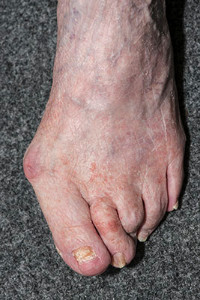
 A bunion is considered to be a bone disorder that can gradually get worse. It appears as a bony protrusion on the side of the big toe, and larger shoes may need to be worn that can accommodate the growing bunion. It generally develops as a result of genetic factors, or from wearing shoes that do not have adequate room for the toes to move freely in. Additionally, existing medical conditions including flat feet and specific types of arthritis, may contribute to the development of a bunion. In severe cases, calluses may form on top of the bunion, and friction may cause this to happen. Some of the symptoms that are associated with this condition may include a numbing or burning sensation, and it may be difficult to move the affected toe. If you have signs of a bunion, it is suggested that you consult with a podiatrist who can guide you toward the correct treatment options.
A bunion is considered to be a bone disorder that can gradually get worse. It appears as a bony protrusion on the side of the big toe, and larger shoes may need to be worn that can accommodate the growing bunion. It generally develops as a result of genetic factors, or from wearing shoes that do not have adequate room for the toes to move freely in. Additionally, existing medical conditions including flat feet and specific types of arthritis, may contribute to the development of a bunion. In severe cases, calluses may form on top of the bunion, and friction may cause this to happen. Some of the symptoms that are associated with this condition may include a numbing or burning sensation, and it may be difficult to move the affected toe. If you have signs of a bunion, it is suggested that you consult with a podiatrist who can guide you toward the correct treatment options.
If you are suffering from bunion pain, contact Dr. Bert Altmanshofer of Pennsylvania. Our doctor can provide the care you need to keep you pain-free and on your feet.
What Is a Bunion?
Bunions are painful bony bumps that usually develop on the inside of the foot at the joint of the big toe. As the deformity increases over time, it may become painful to walk and wear shoes. Women are more likely to exacerbate existing bunions since they often wear tight, narrow shoes that shift their toes together. Bunion pain can be relieved by wearing wider shoes with enough room for the toes.
Causes
Symptoms
In order to diagnose your bunion, your podiatrist may ask about your medical history, symptoms, and general health. Your doctor might also order an x-ray to take a closer look at your feet. Nonsurgical treatment options include orthotics, padding, icing, changes in footwear, and medication. If nonsurgical treatments don’t alleviate your bunion pain, surgery may be necessary.
If you have any questions, please feel free to contact our office located in Duncansville, PA. We offer the newest diagnostic and treatment technologies for all your foot care needs.
Read more about Bunions